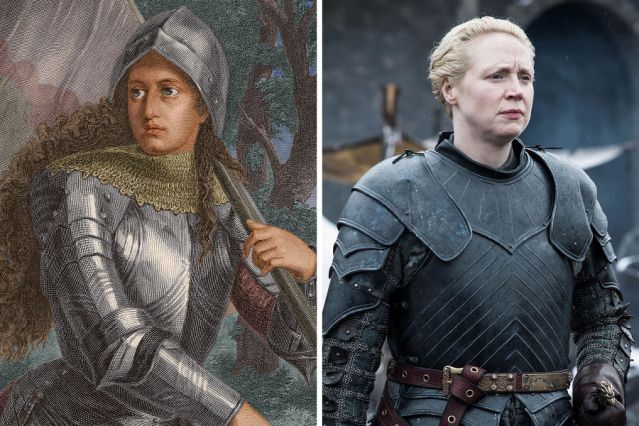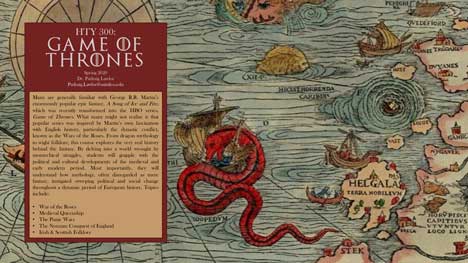Exploring Saint Leo's Popular 'Game of Thrones' History Class
Get a peek into a popular 'Game of Thrones' history class offered at Saint Leo University this spring taught by Dr. Padraig Lawlor at University Campus.

Get a peek into a popular 'Game of Thrones' history class offered at Saint Leo University this spring taught by Dr. Padraig Lawlor at University Campus.

 Few TV shows have matched the popularity of HBO's Game of Thrones. The smash hit, which is based on George R. R. Martin's book series A Song of Ice and Fire, has appealed to a wide range of viewers and is arguably one of the most popular shows of all time.
Few TV shows have matched the popularity of HBO's Game of Thrones. The smash hit, which is based on George R. R. Martin's book series A Song of Ice and Fire, has appealed to a wide range of viewers and is arguably one of the most popular shows of all time.
This spring, Saint Leo University currently has an undergraduate history course devoted entirely to studying the historical relevance of this TV series. Entitled 'Game of Thrones: Medieval Monsters and Monarchies,' this engaging curriculum dives into the factual history within the show and how the producers and writers effectively blended fantasy with reality for a unique combination.
We recently caught up with Dr. Pádraig Lawlor, a history instructor who teaches the course at Saint Leo University, to learn about his background, what inspired him to teach such a curriculum, and what types of unique topics his students are exploring in this class.
A: I am originally from Ireland. I graduated with my bachelor's in English literature and history as a double major from Maynooth University. I earned two master's degrees, one in medieval Irish history from the same university and a second from Trinity College Dublin in early modern European history. I earned a Ph.D. in European history from Purdue University.
A: While working on my doctorate at Purdue, I taught three main classes – medieval history, modern European history from 1500 and onward, and Irish history.
A: I really like the fact that we have such small class sizes. I get to know my students very well since we cap many of our classes at 25. This allows me to mentor many of the students and have that one-on-one connection so I can help them not only learn but also develop as an individual.
A: I think for many people, history is seen as an old, traditional subject. I try to strip away that stereotype and show how history is culturally and societally significant today. That is not to say that the more traditional classes shouldn't play a part in the curriculum, but I believe we can supplement them with new, novel courses such as the Game of Thrones course.
Also, I like to look at different perspectives within history. For example, I'll examine what the peasants and the disenfranchised were doing, not just the kings and queens, throughout various periods in history.
Plus, I'm 28 years old and I feel like I can relate to the students very well because I am basically in their generation. Obviously, this won't always be the case. But I seek to keep in tune with contemporary popular culture and understand what type of media students are consuming on a daily basis.
A: I did read the first book in George Martin's series when I was an English literature major. I was aware of the TV series when it started on HBO. Also, the actor who played Joffrey Baratheon, Jack Gleeson, was going to my college over in Ireland when I was there.
When I started working on my Ph.D., I really focused on the One Hundred Years War and some of the other famous battles of that era. It became very clear to me how the Game of Thrones series was so connected to real historical events. I found some interviews with George Martin where he spoke about how the fighting within the house of The Plantagenets of England and France was such a big inspiration for him in the series. I've also looked at the Wars of the Roses and the philosophical influences underlining the series like the writings of Niccolò Machiavelli and Thomas Hobbes.
A: Yes, but I've only watched up through the fourth season of the series. I was immediately hooked when I saw the first episode. The show was so accurate in the portrayal of the weaponry and society in general.
I also like how they weave in some fantastical elements like dragons. I don't think people always realize how mythology played such a big role in the political dynamics of the time because people truly believed that dragons and other creatures were real at one time.
A: After we were full, several students contacted me asking if they could still get in the class. Unfortunately, we did have to turn some away. The good news is that we hope to offer this class and more of these pop culture-based courses going forward.
A: The only real prerequisite is that students must be at least sophomores to take the class. I will say that this particular class is mostly seniors with some juniors and sophomores sprinkled in.
A: We have a wide range of majors in this class. In general, we've drawn in more non-history majors but have had several of those say that they want to minor in history since being in this class and others I've taught.
We have students majoring in English, literature, biology, criminal justice, medical humanities, education, political science, sociology, psychology, and of course some doing history. This makes the class quite diverse in our discussions.
A: It's a very visual series. It's also pretty slow-paced and offers a lot of detail that people tend to eat up.
Also, the mix of fantasy with actual history makes it so much more engaging. A straightforward historical series wouldn't have nearly the same effect.
Viewers really get invested in the characters as well. For example, Edward of Westminster, who was the Prince of Wales and the son of Henry VI of England and Margaret of Anjou, is the historical inspiration behind the notorious Joffrey Baratheon character. He is so maniacal that you can't turn away from seeing what he might do next.
 Q: What kinds of assignments are students doing in this class?
Q: What kinds of assignments are students doing in this class?A: First off, I want to mention that there are no traditional in-class exams in this class because having students regurgitate dates in this setting doesn't do much for them. It's all about the philosophical and critical thinking behind the information they are studying that they must learn and master. I want them to come up with their own sophisticated arguments and then back them up with historical facts.
The first assignment for the students is to read the Trial of Joan of Arc and write about their interpretation of this original document.
There is also a take-home exam and a final research paper students must complete using a similar approach to the first paper. In these assignments, there's a lot of primary source reading that they must complete before writing up and refining their arguments. I want to read their interpretation of these primary historical documents supported with the necessary evidence.
A: I want them to realize that many periods in history are not that much different than our lives today. Those people living in the medieval era, for instance, are not just footnotes in a book. They were real people who had similar objectives to what people have today.
Also, I hope they realize that history isn't just about picking up old, dusty textbooks. It can be fun and engaging if you use different perspectives to examine it. I hope students look back on this class and say it was fun and that we had lots of laughs, but that we also had plenty of thought-provoking conversations and studied history in a unique way that enabled them to hone their critical thinking skills.
I remember when I was teaching my final class at Purdue University, a student wrote me a note saying that they honestly didn't care about their grade because they learned so much through a new dimension of history. For me, having that positive impact is what it's all about.
A: We offered a 'Witchcraft and Magic in History' course this past fall and are now offering this one. The witchcraft course was met with wonderful feedback from students and faculty alike. It was a pretty intense immersion into the history behind the topic. On a weekly basis, students grappled with primary sources spanning from the ancient to the modern world. The readings were a mix of legal, social, cultural, political, and religious histories – something for everyone. So, we'd like to use these as template courses for the future. I think it's a perfect recipe for a class when you can blend pop culture into history and other disciplines. I would like to eventually offer these specific classes every other year.
I am a major advocate for cross-disciplinary courses as well. In the fall 2020, for example, I will be teaming up with Dr. Chantelle MacPhee in English to teach a course called 'The Luck of the Irish: History and Literature' in which we'll examine key literary texts, figures, and movements in Irish history. These are just a select sample of the new courses to come. I am always reaching out to students asking what topics they would like to study. After all, it is about them and their interests.
A: You can view the syllabus here.
Feel free to e-mail me directly at Padraig.lawlor@saintleo.edu
You can visit my website at www.padraiglawlorhistorian.com and follow me on Twitter.
#SaintLeo